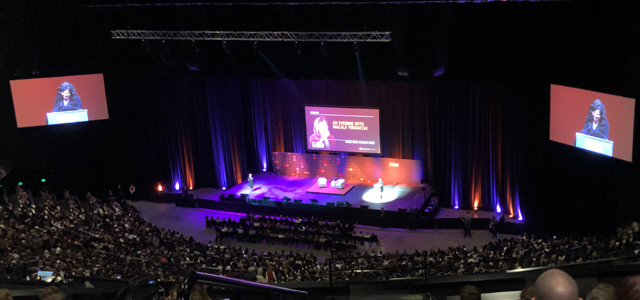The outpouring of support Malala Yousfzai received after being shot in the head by the Taliban has spurred her on to advocate for women worldwide, an audience in Sydney’s International Convention Centre (ICC) heard on Monday, 10 December.
On her first trip to Australia, Malala engaged in conversation with ABC journalist Annabelle Crabbe at the ICC. It was a wide-ranging conversation that touched upon Malala’s recovery, her struggle for education for all girls, life growing up in Pakistan’s Swat Valley, and her current studies at Oxford University.
Malala was born and raised in Pakistan’s Swat Valley, an idyllic place that was previously a holiday destination. She recalled that things changed for her when the Taliban moved in in 2007 and enforced a ban on girls undertaking education.
“The fact that I stand up for the right of girls to go to school was because I [couldn’t],” Malala said.
At first, she did not believe that the ban would go ahead when locals were given notice.
“But then that day did come and I woke up on 15 January and could not go for school,” she said.
“Education is not just reading and writing, education is the future of girls. All these girls have dreams, they all want to become something in their lives.”
“They just need to [be given the chance] to live up to their potential.”
Much of Malala’s passion for education came from her father, who always encouraged her to share her opinions and pursue education. Her dad, she recalled, started a school in their local area with three students. By the time they left Pakistan, this had grown to 1100.
Life in Swat changed in many other ways. Malala could not go to school, the shops, or watch TV. Even children’s playtime changed, as cops and robbers became Talib versus the army.
“The two main targets were women and entertainment,” she said.
Malala has lived in the United Kingdom since. She mentioned that this experience had made her think of the 65 million people who are currently displaced, which is the basis of her next book, We Are Displaced, due out in January.
The last thing she remembers about her life in Pakistan is being on the school bus where the Taliban shot her in the head. Lifesaving surgeries took place in Pakistan. But when she woke she knew she was not in Pakistan anymore. After these initial surgeries, Malala was transported to Birmingham, England for further recovery surgeries.
According to Malala, she “thanked God” when she woke up. Incapable of speech at first, Malala had to resort to writing notes to the doctors instructing them that her parents could not afford her treatment.
“I was concerned about two things: where is my father and who’s gonna pay?” said Malala.
Malala said that the outpouring of support was what made her want to speak out for girls all around the world. She briefly returned to Pakistan in March 2018. She said that she was initially cautious about Pakistan’s political environment but eventually decided the time was right.
“If you think about politics, especially in Pakistan, you will never go.”
Malala was greeted by more than 600 family members and friends in what she described as an emotional visit. She told the audience that she eventually wants to return to Pakistan after her studies are complete.
The Malala Fund
Malala’s passion for seeing girls in her position educated carries over to her eponymous foundation, which invests in local change makers and activists in India, Pakistan, Brazil, Afghanistan, and Lebanon, among others. Projects differ according to local need. A project in Brazil, for example, focusses on indigenous Brazilian girls.
Educating girls, Crabbe pointed out, had many other effects including for climate change mitigation.
“We’re talking about other issues from climate change…to bringing people out of extreme poverty,” Malala agreed.
“Educating girls is crucial. Inequalities are global.
“Even if you go to Australia, or the US, or the UK, you know that girls are discriminated against.”
She said there needed to be more women in parliament and corporate boardrooms. The #MeToo movement, Malala said, was bringing to the west a particular awareness of how common sexual harassment is. This, she said, had often been spoken about in the “so-called developing world.”
Malala started studying at Oxford University in 2017 and has moved out of home. Her degree is in Politics, Philosophy, and Economics, a course that she told the audience, “is quite competitive.”
Malala is based out of Oxford’s Lady Margaret Hall, a college that was amongst the first to offer places to women when it opened in 1878.
“It’s very special to me that I am in a college that thought about women and their education,” she said.
We Are Displaced: My Journey and Stories from Refugee Girls Around the World releases on 8 January.
Jonathan Foye is Insights’ Editor






